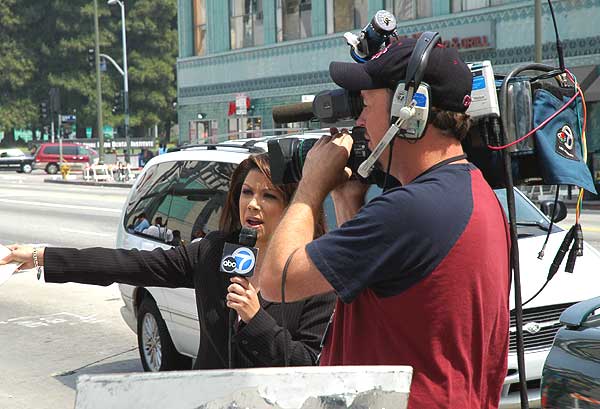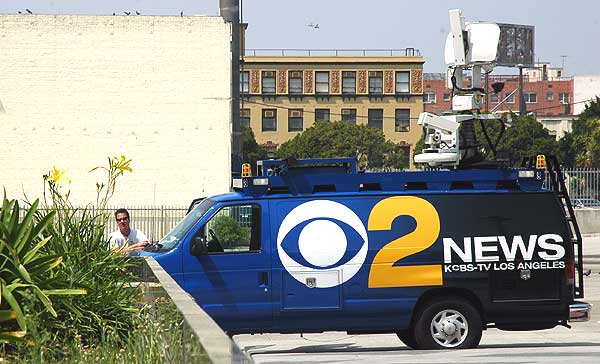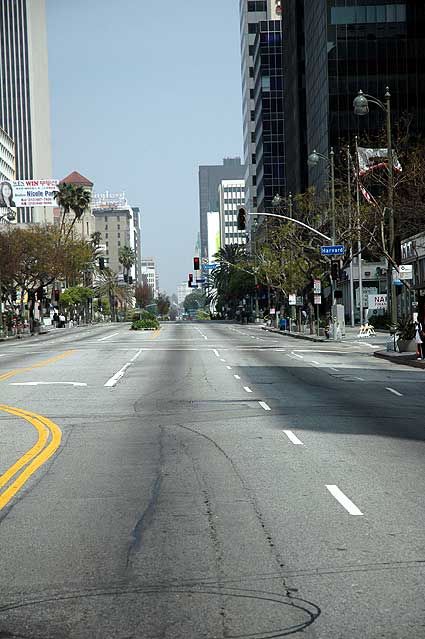Are we living in the only banana republic armed with nuclear weapons? More on the specifics of that below.
But just what was the state of play as the week ended? At six in the evening on Friday, April 28th, out here on Los Angeles (three in the morning Saturday in Paris and early afternoon Saturday in Baghdad and Tehran) in the other room the television, on mute, was showing, for the fourth of fifth time this week, The Hunt for Red October. Harriet-the-Cat was watching. At one point in that film the Lithuanian-born soviet sub captain, played by Sean Connery in Scottish-accented English and Russian, peers through the periscope, sees the periscope of the American sub chasing him and barks out "mark this bearing."
So mark this bearing.
Note that the end of the week there was this, as the business with Iran came to a head -The United Nations' atomic monitoring agency reported Friday that Iran continues to expand its uranium enrichment technology and to hold back information that would allow inspectors to determine whether a covert military nuclear program exists.
The report by the Vienna-based International Atomic Energy Agency said Iran is conducting an enrichment program in defiance of U.N. Security Council demands to halt it. Agency inspectors who visited Iranian sites observed construction of additional centrifuges for expanding uranium enrichment operations, the report said.
Agency inspectors found no "undeclared nuclear material in Iran," the report said. But it added that because of information gaps, "including the role of the military in Iran's nuclear program, the agency is unable to make progress in its efforts to provide assurance about the absence of undeclared nuclear material and activities in Iran."
The report gives the United States and other Western countries ammunition to convene a debate in the U.N. Security Council next week on possible sanctions or other international pressures against Iran. Within minutes of the report becoming public late Friday afternoon Europe time, British officials urged such a debate.
... Members of the U.N. Security Council are divided on how best to persuade Tehran to back off from its nuclear program. The United States, France and Britain have been seeking international support for possible sanctions. But, China and Russia, which both have veto power on the council and strong trade ties to Iran, are advocating less provocative diplomatic channels.
This is not good. The IAEA reported back that they just cannot say if Iran is working on someday making nuclear weapons. Iran is holding back key information, just as they said they would, in reaction to all the not so subtle threats we made through third parties (we certainly won't talk with them). And it appears the UN will be useless here, as Russian and China, two members of the Permanent Security Council, don't much want severe action.
Earlier in the day, our UN ambassador, John Bolton, the man who made a career out of saying the UN was useless and should be abolished, and who the Senate would not confirm to this UN post, was on television saying this Iran was a grave danger, and hinting we might have to bomb the crap out of Iran to slow their nuclear program if the UN turned out to be as useless as he has always said it was. Yeah, yeah, the self-fulfilling prophecy and all that. Secretary of State Rice was saying the UN just had to do something about this, hinting that if the UN didn't we would. The president was making statements that now the diplomacy would really begin, by which he seemed to mean other people's diplomacy and certainly not ours - we're the nation that stands back while other nations try diplomacy, telling them it never works but they should probably try, while making comments on how hopeless diplomacy usually is, and when it doesn't work we say "told you so." Then we use our tool of choice, our military. It's very curious.
But Friday was the day things came to head. It'll eventually be the diplomacy of the "lesser nations" - the ones forced by their powerlessness to rely on diplomacy - that resolves this, or the military of the world's one remaining superpower, or hyper-power as the French would put it. That is unless everyone agrees that over there - what the heck - Israel, Pakistan, India and soon Saudi Arabia have the bomb. And to the north Russian has the bomb. Let Iran go for it. What difference does it make now?
And as for the hyper-power business, note this - al-Qaida Leader Sees 'Broken' U.S. in Iraq - "Hundreds of suicide bombings in Iraq have 'broken the back' of the U.S. military, al-Qaida's No. 2 said in a video posted Saturday - the latest in a series of messages from the terror network."
That's the third in a week. Last weekend it was Osama himself saying he didn't much like our "Zionist-crusader war on Islam" and urging militants to fight in Sudan too, and calling for attacks on civilians in the west, as they elected those waging "war on Islam." Tuesday it was the man who is "al Qaeda in Iraq" - Abu Musab al-Zarqawi - dismissing Iraq's new government as an American "stooge" and calling it a "poisoned dagger" in the heart of the Muslim world. Now Osama bin Laden's Dick Cheney is saying this here hyper-power is basically broken.
Our Dick Cheney will no doubt say these three messages just prove how desperate al Qaeda is, and say they are proof we're winning "big time." Or maybe he already has said that. If he hasn't he will. He always does.
It hardy matters. It's just talk.
As for what else came to a head as the odd week ended, there was this, a story out of Chicago that hit the New York Times Friday but finally ended up where it should, in Saturday's International Herald Tribune (Paris) -The City Council has voted to make Chicago the first city in the United States to outlaw the sale of foie gras, the fatty livers of geese and ducks that many consider a delicacy but that animal rights advocates describe as a product of inhumane treatment.
The ban, adopted Wednesday on a vote of 48 to 1, makes "food dispensing establishments" - restaurants and retail stores - subject to a fine of $500 for selling foie gras. The ordinance, which takes effect in 90 days, will be enforced by means of citizen complaints, said Joe Moore, the alderman who sponsored it.
Many in the restaurant industry said the ban would have little effect on business, but they condemned it as an unwarranted intrusion by city officials.
"Government shouldn't be dictating what we eat," said Rick Tramonto, executive chef at a French restaurant, Tru. "It's just not right."
... Mayor Richard Daley was not enthusiastic.
"We have children getting killed by gang leaders and dope dealers," Daley said in an interview with The Chicago Sun-Times. "We have real issues here in this city. And we're dealing with foie gras? Let's get some priorities."
Richard Daley has a point, and his frustration mirrors the national mixing of the minor with the major - at the end of the week the possibility of the United States launching a pre-emptive war on a nation that might one day be a threat and starting a major regional war in the Middle East was given less press coverage than the business with the lacrosse players at Duke (went there for graduate school so no comment) and the outrage that someone had recorded a version of the National Anthem in Spanish (the president said that was just wrong and Howard Dean said on MSNBC that he didn't care what language anyone sang it in, as it seemed actually kind of a patriotic thing.
The other big story that wasn't was this first reported in a Bradenton Florida newspaper -Rush Limbaugh was arrested Friday on prescription drug charges, law enforcement officials said.
Limbaugh turned himself in to authorities on a warrant issued by the State Attorney's Office, said Teri Barbera, a spokeswoman for the State Attorney's Office.
The conservative radio commentator came into the jail at about 4 p.m. with his attorney Roy Black and bonded out an hour later on a $3,000 bail, Barbera said.
The warrant was for fraud to conceal information to obtain prescription, Barbera said.
But it wasn't what it seemed, as the Associated Press reported here -In response to media and other inquiries, Roy Black, Rush Limbaugh's attorney, released the following statement today concerning a settlement agreement with the Palm Beach County State Attorney's Office to end the investigation of Mr. Limbaugh:
"I am pleased to announce that the State Attorney's Office and Mr. Limbaugh have reached an agreement whereby a single count charge of doctor shopping filed today by the State Attorney will be dismissed in 18 months. As a primary condition of the dismissal, Mr. Limbaugh must continue to seek treatment from the doctor he has seen for the past two and one half years. This is the same doctor under whose care Mr. Limbaugh has remained free of his addiction without relapse.
"Mr. Limbaugh and I have maintained from the start that there was no doctor shopping, and we continue to hold this position. Accordingly, we filed today with the Court a plea of 'Not Guilty' to the charge filed by the State.
"As part of this agreement, Mr. Limbaugh also has agreed to make a $30,000 payment to the State of Florida to defray the public cost of the investigation. The agreement also provides that he must refrain from violating the law during this 18 months, must pay $30 per month for the cost of "supervision" and comply with other similar provisions of the agreement.
There was no arrest. This was a plea deal in an old case that no one wanted to pursue. Charges will be dismissed in eighteen months. And it's much better than a deferred judgment which requires a guilty plea, as one attorney noted. The mug shot, all over the web, and the court appearance, were just administrative crap. False alarm. The voice of conservative talk radio was just tying up some loose ends.
The real arrests of interest as the week ended were reported here -WASHINGTON, April 28 (Reuters) - Five members of the U.S. Congress were arrested on Friday at a demonstration held at the Sudan embassy to protest atrocities in that country's Darfur region, congressional aides said.
The lawmakers, all Democrats, were Reps. Tom Lantos of California, James McGovern and John Oliver of Massachusetts, James Moran of Virginia, and Sheila Jackson Lee of Texas, aides to McGovern and Lantos said.
Now that's cool. It's not every day five members of congress are arrested for disorderly conduct and unlawful assembly. Actually, that may be a first. Want to see video footage of the arrests? That's here (QuickTime) or here (Windows Media).
But of course these congress folks aren't very photogenic. As someone once said, Washington is Hollywood for ugly people. The day before, as noted in the Los Angeles Times entertainment section here, the superstar George Clooney (and his elderly retired newsman father Nick), just back from Chad (as close as you can get Darfur in western Sudan these days) the day before held a press conference with the wildly conservative Oklahoma senator Sam Brownback and the rising progress-liberal star of the Senate, Barack Obama of Illinois. The basically said preventing genocide is not exactly a partisan issue - and this clearly is genocide as the Sudanese government bombs the folks they want out of the western Sudan and then the semi-official militias move in, kill all the men and children and rape the women. Those who escape to the west end up in Chad, without food and shelter, dying there. We're talking hundreds of thousand of people here, and, as above, Osama bin Laden is calling for all Muslims to drop by and help the Sudanese government get rid of the "wrong Muslims" there, and their non-Muslim friends.
There's not a lot of ambiguity here. Even our president has said this is genocide, and thinks maybe NATO or someone should do something about it, maybe even the totally useless UN.
The Times quotes Clooney suggesting maybe more people should know just what's going on, and do something, even if it's just sending blankets and food - "There's no right or left, there is no conservative or liberal point of view. There is only right or wrong." He was all over the airwaves at the end of the week, CNN, MSNBC, and even Fox News, where Sheppard Smith solemnly agreed with him.
Yeah, well, it's always more complicated, as noted here -The reflexive new comment to make about Darfur is "what better way to tick off Osama bin Laden?" now that he has linked support for the Sudanese government to fighting the United States. The reality is sadder and more complex - while a moral person has no choice but to proactively engage the only declared genocide of the century, America is forced to consider what effect any action in the Middle East will have on the war on terror. The tragedy (upon Tragedy) is that Osama's latest tape should be a gift to us. What better propaganda opportunity for the United States than to show the wholesale slaughter of - Muslims - to the Muslim World (Arab and elsewhere) and ask who they stand with? Isn't that exactly what "the Enemy" does with images from the Palestinian occupation? If we had that Radio/TV Free Middle East we were promised, Darfur would make for a great campaign, but the Administration values intelligence ties with Sudan and relations with Sudan's protectors in the Arab league more than the thought of a direct appeal to the "Arab Street."
Thus we talk about how someone should do something. But it won't be us, no matter how many congressmen are arrested at demonstrations, or who shows up from Hollywood.
Besides, the president has other issues on his plate, specifically the record high price of gasoline. Yeah, so he started a war in Iraq that took a good chunk of the world's supply of oil off the market for more than three years, just when demand in China and India was exploding. Oops. Prices rose. It's a supply and demand thing. But he has a solution - Friday he announced he wants congress to give him the power to set mileage standards for American cars, bypassing any laws they pass and whatever the Transportation Administration says, or the Environmental Protection Agency, or anyone else at all. He said he alone should be "the decider" and said he'd use the power "wisely" - you could trust him. Congress may respond next week. It's a test. The response will weed out the traitors to him in his own party, and let him know, and the idea settles in with the resulting news stories, if the polls are all wrong and people still really do trust him.
That should be interesting.
You should trust him and his supporters? Maybe, but the same day there was this - Congresswoman Jean Schmidt of Ohio, down Cincinnati way, the woman who, on the House floor, called a decorated war veteran and military insider a coward for suggesting there might be better ways to get things done in Iraq, was reprimanded by the Ohio Elections Commission for padding her resume. Severely. She said she had two college degrees when she had only one, a violation of campaign law, and they mentioned a long series of other deceptions and distortions. They were one step away from suggesting she be sent to jail. Oops.
Ah well, the Vietnam War fighter pilot president would never mislead people like that. Schmidt was never a fighter pilot.
And the Schmidt story is a minor thing, and has at its core stuff about college degrees. Boring, boring, boring. What we need is a story about sex!
And glory be, we got one! And it was all over the web as the week ended.
Oddly, it first surfaced in the Wall Street Journal here, but then everyone knows the Wall Street Journal is a first rate and objective newspaper, with a whacky right-wing editorial page.
The item -Federal prosecutors are investigating whether two contractors implicated in the bribery of former Rep. Randall "Duke" Cunningham supplied him with prostitutes and free use of a limousine and hotel suites, pursuing evidence that could broaden their long-running inquiry.
Besides scrutinizing the prostitution scheme for evidence that might implicate contractor Brent Wilkes, investigators are focusing on whether any other members of Congress, or their staffs, may also have used the same free services, though it isn't clear whether investigators have turned up anything to implicate others.
Cool. And that was followed a short item in Harpers here -The two defense contractors who allegedly bribed Cunningham, said the Journal, were Brent Wilkes, the founder of ADCS Inc., and Mitchell Wade, the founder of MZM Inc.; both firms profited greatly from their connections with Cunningham. The Journal also suggested that other lawmakers might be implicated. I've learned from a well-connected source that those under intense scrutiny by the FBI are current and former lawmakers on Defense and Intelligence committees - including one person who now holds a powerful intelligence post. I've also been able to learn the name of the limousine service that was used to ferry the guests and other attendees to the parties: Shirlington Limousine and Transportation of Arlington, Virginia. Wilkes, I've learned, even hired Shirlington as his personal limousine service.
It gets even more interesting: the man who has been identified as the CEO of Shirlington has a 62-page rap sheet (I recently obtained a copy) that runs from at least 1979 through 1989 and lists charges of petit larceny, robbery, receiving stolen goods, assault, and more. Curiously - or perhaps not so curiously given the company's connections - Shirlington Limousine is also a Department of Homeland Security contractor; according to the Washington Post, last fall it won a $21.2 million contract for shuttle services and transportation support. (I tried to contact Shirlington but was unable to get past their answering service.)
As to the festivities themselves, I hear that party nights began early with poker games and degenerated into what the source described as a "frat party" scene - real bacchanals. Apparently photographs were taken, and investigators are anxiously procuring copies. My heart beats faster in fevered anticipation.
Juicy stuff, and everyone thinks the person "who now holds a powerful intelligence post" is Poster Goss, the current CIA director, who was a Florida congressman back then, head of the house intelligence committee. Amd the kicker is all this took place at the Watergate complex. Watergate? Amusing.
But the San Diego Tribune owns the story, and note this -Last night on MSNBC's Scarborough Country, Dean Calbreath of the San Diego Union Tribune - which recently won a Pulitzer Prize for its coverage of the Cunningham case - said that "as many as a half a dozen" members of Congress could ultimately be implicated in the prostitution scandal.
This is so much more fun than a strange, butter woman from southern Ohio lying on her résumé.
Then it gets positively Byzantine, as the San Diego paper adds this -People who were present at the games said one of the regular players was Kyle Dustin "Dusty" Foggo, who has been Wilkes' best friend since the two attended junior high school in Chula Vista in the late 1960s. In October, Foggo was named the CIA's executive director - the agency's third-highest position.
Now this Foggo fellow has come up in these pages before - from March 5th see Getting the Details Wrong, and the Concept - and he certainly has a great name.
The key comment? Bill Montgomery here -As long as it's only a contracting scandal (with the added fillips of sex and spies) this really isn't much more than a surreal variation on standard operating procedure in Jack Abramoff's Washington - even if the call girl angle does get the cable news juices flowing (so to speak.)
But it's at least possible that the intersection of sex, money and official secrecy will turn this story into something much more special. Who knows? Depending on how high the guest list goes for Wilkes's poker-and-prostitution soirées, this might even become the redneck equivalent of the Christine Keeler affair.
... It's only an educated guess - but also a reasonable one, given that Brent Wilkes and Mitchell Wade, the two contractors involved, were maneuvering to stick their dicks in the intelligence community's contracting honeypot as well as the Pentagon's. Goss's previous jobs as chairman of the House Intelligence Committee and vice chairman of the low-key but powerful House Rules Committee (which controls the flow of legislation to the floor) obviously would have made him an extremely attractive piece of bowel material to a couple of intestinal parasites like Wilkes and Wade.
But Porter Goss, head of the CIA, involved in all this? Maybe. Maybe not. As in this -On the other hand, Goss has a lot of enemies, including just about the entire career staff at the CIA, which he has been industriously purging of suspected Democrats at the behest of his White House masters. (If Porter ever turns up dead, the suspect list is going to include half of the McLean, Va. phone book and most of the world's professional assassins.) So who knows? Maybe it's just ex-spook disinformation - like the bit about the couple of dozen senior White House aides who were supposed to be indicted in the Plame case last October.
... OK, I know I'm getting carried away here. But this is really creepy stuff - and only contributes to the impression I sometimes have that we're now living in the only banana republic armed with nuclear weapons. (Or, as I've also been known to call it, North Argentina.)
I mean, we've got political purges underway in the organs of state security; a one-party legislature run by guys who write their names above the urinals at expensive K Street restaurants ("For a good time, call Duke") and - according to Harper's - limo services tied to call girl rings pulling down multi-million dollar contracts with the Department of Homeland Security, which itself sounds like a name dreamed up for the movie Brazil.
Forget Fellini, even Terry Gilliam couldn't do this justice.
Who knows what's going on? But note here - the reporter calls Goss' office at the CIA and gets a denial. He was not involved in any of this.
But what's this about this being the only banana republic armed with nuclear weapons?
Well, there's Glenn Greenwald here -Over the last five years, our country has been gradually though incessantly changing in fundamental and radical ways. The things we see and hear our government doing are squarely at odds with how we perceive of ourselves as a nation and the values which Americans, by definition, universally embrace. We have watched while this administration imprisoned U.S. citizens on U.S. soil and claimed the right to keep them there indefinitely with no trial, no charges and no access to lawyers; routinely used torture as an interrogation tool; created secret gulags in former Soviet Eastern European prisons in order to detain people beyond the reach of the law or monitoring; and eavesdropped on American citizens, on U.S. soil, without warrants or oversight of any kind in patent violation of a 28-year-old law which makes warrantless eavesdropping on Americans a criminal offense.
Those scandals have received their fair share of attention, but this critical point has not: all of those scandals stem from the fact that we have a president who, expressly and out in the open, claims that he has the power to act in the broadly defined area of national security (which includes measures taken against American citizens on U.S. soil) without any "interference" from anyone - including Congress, the courts, and even the law. In sum, we are radically changing our system of government, and, in the process, have transformed ourselves from a country that, for decades, was widely respected as a restrained and principled superpower into an amoral, highly militaristic and aggressive state which is widely feared and despised.
... The president's approval rating didn't plummet from 60% to 33% because "liberals" changed their minds. That has happened because people who were open to standing behind the president -and who, for several years, did support him and his policies - have changed their minds about his competence, his likeability, his trustworthiness, and the overall wisdom of his world-view. That is an extraordinary shift. The group of people who believe that the Bush presidency is a failure extends far beyond "the Left" and includes virtually every group on every point on the political spectrum.
George Bush isn't just an unpopular president. He is close to reaching historic levels of disapproval. Richard Nixon's approval rating at the time he resigned his office after two years of the Watergate scandal was 25% - only 8 points below the lowly level to which Bush has tumbled. As is clear, the vast majority of Americans believe that the Bush presidency has taken us down a very ill-advised and destructive path and attempts to explore how and why that happened - and what can be done about it - are naturally going to find a receptive audience.
Well, Greenwald's new book was number one on the Amazon bestseller list, three weeks before its publication date, as the week ended. It seems a good number of people just don't want to live in a sort of banana republic with an insecure braggart tin-pot dictator in charge. Maybe it's nostalgia, for what we think we once were, and may actually have been.
And feeding the nostalgia is the old rocker from the late sixties and seventies, Neil Young, who started his career when he met the guys who formed Buffalo Springfield one block down the street at Sunset and Laurel Avenue, a block east of where the Garden of Allah complex once stood, the bungalows of the stars they tore down to build a strip mall and Joni Mitchell sang about in "they tore paradise down and put up a parking lot" (they really did). Joni Mitchell used to live just up the hill in Laurel Canyon. So did Neil Young, and he's back, with a new album and a hot single - "Let's Impeach the President." You can listen to the single here or the whole album, "Living With War" here. It's free. It's a sixties thing.
We will, of course, have a new president in a few years, and maybe Hillary Clinton, but note what Eric Rauchway says here -If the lineup of our Presidents were to read Bush-Clinton-Bush-Clinton, that in itself would suggest that our republic is broken. I know, only old Catonians like me find it troubling that we'd evidently like to hand the Constitution over to two feudin' clans. But it's flat not right.
Yep, it's banana republic stuff. But that's what we have. But you can also think of it as the Hatfield-McCoy model, and we get to choose which hillbilly dolt we dislike a bit less than the other at the moment.
And the banana republic stuff rolls on, as Matthew Yglesias notes here -This article on revised Congressional Research Service estimates of spending on the Iraq War is pretty dull until the end, but then it starts to get interesting. The report apparently contains such phrases as "These factors, however, are not enough to explain a 50-percent increase of over $20 billion in operating costs" and "These reasons are not sufficient, however, to explain the level of increases." Relatedly, the Post reports that "Of the total war spending, the CRS analysis found $4 billion that could not be tracked. It did identify $2.5 billion diverted from other spending authorizations in 2001 and 2002 to prepare for the invasion." I'm fairly sure you're not allowed to "divert" money from other spending authorizations, and you're certainly not supposed to lose $4 billion in untrackable spending. Nor does it sound entirely appropriate for the Pentagon to be running its operation in such a way that the CRS can't discern the causes of 50 percent spending increases. All the sort of thing a real congress would hold some hearings on, and, once again, I won't be holding my breath.
I'm fairly sure you're not allowed to "divert" money from other spending authorizations? That doesn't take much research. Article I, Section 9 of the Constitution: No Money shall be drawn from the Treasury, but in Consequence of Appropriations made by Law.
There's some secret stuff going on, or some good parties. Yglesias says "back in olden times when we still cared what the Constitution said, Bush could clearly be impeached for this." Those would be the Neil Young days. He's back, but maybe times have moved on. We'll see how the album does, and the single.
Things are different now, as in this from Texas -Prosecutors won't immediately seek hate-crime charges against two white teens accused of brutally beating and sodomizing a 16-year-old Hispanic boy, who was clinging to life after being left for dead, authorities said.
The two attacked the boy after he tried to kiss a 12-year-old girl at an unsupervised house party Saturday night in suburban Spring, authorities said.
The attackers apparently were offended at the age difference between the victim and the girl, who is also Hispanic, and shouted racial slurs at him during the 10- to 15-minute attack, investigators said.
Authorities said the two dragged the boy from the party and into the yard, where they sodomized him with a plastic pipe from a patio table umbrella and poured bleach on him.
"After they got him down on the ground, they stomped his head with (steel-toed) boots," Harris County Sheriff's Lt. John Denholm said. "They actually kicked the pipe further into him with the boots."
County prosecutor Mike Trent described the pipe as being sharpened at one end. At one point, the teens tried to carve something on the boy's chest with a knife, he told CNN Friday.
"I don't know that the very beginning of the attack was racial," Trent said, "but there's no question that they were venting quite a bit of hatred in their hearts."
That'd be a good guess. On the other hand, maybe they were just "blowing off steam" and this is no big deal, as that's what the man with the drug issues, Rush Limbaugh, said here about what happened at Abu Ghraib - just having a little fun.
The banana republic thing may be a bit of stretch, but things sure have changed.
 "Immigrants and their supporters were gathering in cities across the country today for demonstrations and an economic boycott intended to show the impact the workers have on the nation's economy… The demonstrations took many forms and included people from a disparate number of countries, many of them in Latin America, but also from Asia and other parts of the world." – New York Times, Nationwide Immigrant Rallies Are Under Way, Monday, May 1, 2006
"Immigrants and their supporters were gathering in cities across the country today for demonstrations and an economic boycott intended to show the impact the workers have on the nation's economy… The demonstrations took many forms and included people from a disparate number of countries, many of them in Latin America, but also from Asia and other parts of the world." – New York Times, Nationwide Immigrant Rallies Are Under Way, Monday, May 1, 2006















 The new issue of
The new issue of